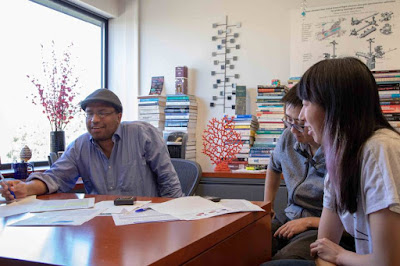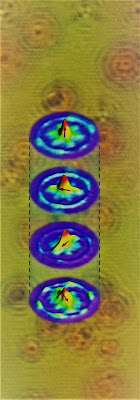Topics: Modern Physics, Nanotechnology, Quantum Computer, Quantum Mechanics
An international team of researchers led by Princeton physicist Zahid Hasan has discovered a quantum state of matter that can be “tuned” at will — and it’s 10 times more tuneable than existing theories can explain. This level of manipulability opens enormous possibilities for next-generation nanotechnologies and quantum computing.
“We found a new control knob for the quantum topological world,” said Hasan, the Eugene Higgins Professor of Physics. “We expect this is tip of the iceberg. There will be a new subfield of materials or physics grown out of this. … This would be a fantastic playground for nanoscale engineering.”
Hasan and his colleagues, whose research appears in the current issue of Nature, are calling their discovery a “novel” quantum state of matter because it is not explained by existing theories of material properties.
 |
| Hasan discusses the discovery with Yin and Zhang in his office in Jadwin Hall.Photo byNick Barberio, Office of Communications |
Hasan’s interest in operating beyond the edges of known physics is what attracted Jia-Xin Yin, a postdoctoral research associate and one of three co-first-authors on the paper, to his lab. Other researchers had encouraged him to tackle one of the defined questions in modern physics, Yin said.
“But when I talked to Professor Hasan, he told me something very interesting,” Yin said. “He’s searching for new phases of matter. The question is undefined. What we need to do is search for the question rather than the answer.”
The classical phases of matter — solids, liquids and gases — arise from interactions between atoms or molecules. In a quantum phase of matter, the interactions take place between electrons, and are much more complex.
“This could indeed be evidence of a new quantum phase of matter — and that’s, for me, exciting,” said David Hsieh, a professor of physics at the California Institute of Technology and a 2009 Ph.D. graduate of Princeton, who was not involved in this research. “They’ve given a few clues that something interesting may be going on, but a lot of follow-up work needs to be done, not to mention some theoretical backing to see what really is causing what they’re seeing.”
Hasan has been working in the groundbreaking subfield of topological materials, an area of condensed matter physics, where his team discovered topological quantum magnets a few years ago. In the current research, he and his colleagues “found a strange quantum effect on the new type of topological magnet that we can control at the quantum level,” Hasan said.
Princeton scientists discover a ‘tunable’ novel quantum state of matter
Liz Fuller-Wright, Office of Communications, Princeton University

Comments